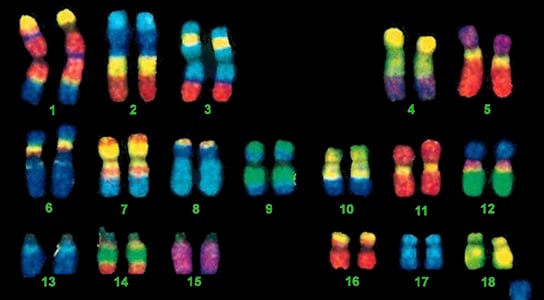
Human populations have grown exponentially in the past 5,000 years, and new genetic mutations arise in each new generation. Humans have a vast abundance of rare genetic variants in the protein-encoding sections of the genome. A new study tries to clarify when many of these rare variants arose.
The scientists published their findings in the journal Nature. Researchers used deep sequencing to locate and date more than one million single nucleotide variants. These are locations where a single letter of the DNA sequence is different from other individuals. The genomes of 6,500 African and European Americans were analyzed. The findings confirm that the majority of variants were picked up in the past 5,000 to 10,000 years. The scientists also saw the markers of the diverging migratory history of the two groups.
The sample size, 4,298 North Americans of European descent and 2,217 African Americans, has allowed researchers to mine down into the human genome. They were able to dig out genetic variants occurring in less than 0.1% of the sample population, which is a resolution a full order magnitude finer than was achieved in previous studies.
Of the 1.15 million single nucleotide variants among the more than 15,000 protein-encoding genes, 73% arose in the past 5,000 years. On average, 14% of the variants were harmful. Of that 14%, 86% arose in the past 5,000 years.
The scientists discovered that European Americans had a larger proportion of potentially harmful variants, which is probably an effect of their original migration out of Africa. The first group that left Africa experienced a sudden drop in genetic diversity, a sort of bottleneck, due to the smaller pool of possible mating partners. In the rapid expansion that followed, selection was slow to catch up and weed out potentially harmful variants.
The results indicate that humans are carrying around a larger number of deleterious mutations than they did a few thousand years ago, suggesting that most diseases are caused by more than one variant and that diseases could operate through different genetic pathways and mechanisms in different people.
Reference: “Analysis of 6,515 exomes reveals the recent origin of most human protein-coding variants” by Wenqing Fu, Timothy D. O’Connor, Goo Jun, Hyun Min Kang, Goncalo Abecasis, Suzanne M. Leal, Stacey Gabriel, Mark J. Rieder, David Altshuler, Jay Shendure, Deborah A. Nickerson, Michael J. Bamshad, NHLBI Exome Sequencing Project and Joshua M. Akey, 28 November 2012, Nature.
DOI: 10.1038/nature11690
2 Comments
Great article, great site. Looking around, I don’t see any way to “Share” article. You’ll get a lot more exposure & a lot more subscribers if your webmaster can set up a Share function for the various social media tools we use, (Twitter, Facebook, Reddit, etc.).
At the bottom of every article you can find the social media tools.